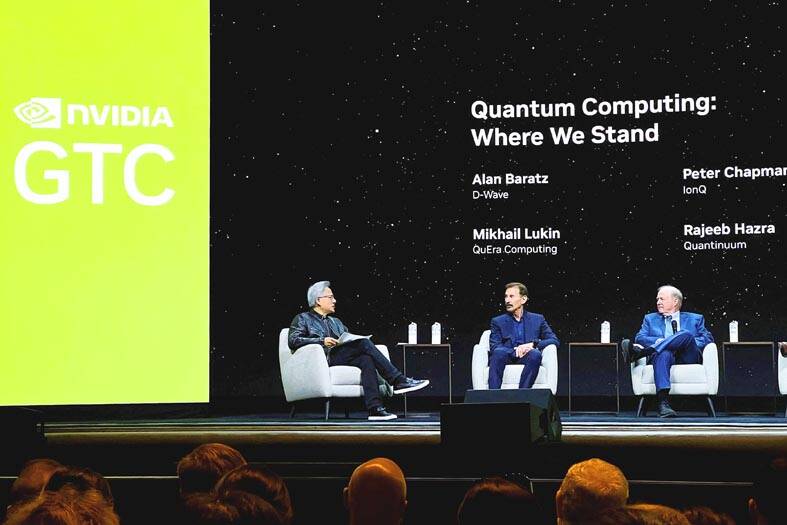Nvidia is to open a quantum computing research lab in Boston, where it plans to collaborate with scientists from Harvard University and the Massachusetts Institute of Technology, Nvidia CEO Jensen Huang (黃仁勳) said on Thursday.
Huang made the announcement at Nvidia’s annual software developer conference in San Jose, California, where the company held a day of events focused on quantum computing.
Nvidia added the program after Huang in January said that useful quantum computers are 20 years away, comments that he sought to walk back on Thursday while joined onstage by executives from quantum computing firms.

Photo: Reuters
“This is the first event in history where a company CEO invites all of the guests to explain why he was wrong,” Huang said.
Huang said he did not realize there were publicly traded quantum computing firms when he made earlier comments that caused shares of IonQ Inc and other companies to crash.
“My first reaction was, I didn’t know they were public. How can a quantum company be public?” Huang said at Thursday’s event focused on the still-nascent technology.
The quantum computing industry aims to use the unique properties of subatomic particles to process data much faster than traditional semiconductor-based electronics. The technical difficulties of building practical systems have meant that the field is still in an experimental stage. In addition to quantum upstarts, companies such as Microsoft Corp and Alphabet Inc’s Google are trying find practical uses for quantum systems.
The companies on stage at Thursday’s event included IonQ and D-Wave Quantum Inc.
Huang said it was natural for this new form of computing to take many years to develop since it was so novel. The companies might be able to convince him that quantum computing is happening more quickly than he expected, he said.
“But I don’t know,” he joked.
“This whole session is going to be like a therapy session for me,” he said.
The six company leaders on stage gave him a variety of answers. Some argued that quantum computers are already in use to solve difficult science problems. Others posited that the technology is even closer to helping advance traditional computing.
Executives also said it was not unreasonable to spend a decade honing a technology that will have such a large impact.
Pasqal CEO Loic Henriet said the term “quantum computing” was misleading.
Quantum processors will help act as accelerators — working alongside traditional computers — rather than replacing them, he said.

AI SERVER DEMAND: ‘Overall industry demand continues to outpace supply and we are expanding capacity to meet it,’ the company’s chief executive officer said Hon Hai Precision Industry Co (鴻海精密) yesterday reported that net profit last quarter rose 27 percent from the same quarter last year on the back of demand for cloud services and high-performance computing products. Net profit surged to NT$44.36 billion (US$1.48 billion) from NT$35.04 billion a year earlier. On a quarterly basis, net profit grew 5 percent from NT$42.1 billion. Earnings per share expanded to NT$3.19 from NT$2.53 a year earlier and NT$3.03 in the first quarter. However, a sharp appreciation of the New Taiwan dollar since early May has weighed on the company’s performance, Hon Hai chief financial officer David Huang (黃德才)

The Taiwan Automation Intelligence and Robot Show, which is to be held from Wednesday to Saturday at the Taipei Nangang Exhibition Center, would showcase the latest in artificial intelligence (AI)-driven robotics and automation technologies, the organizer said yesterday. The event would highlight applications in smart manufacturing, as well as information and communications technology, the Taiwan Automation Intelligence and Robotics Association said. More than 1,000 companies are to display innovations in semiconductors, electromechanics, industrial automation and intelligent manufacturing, it said in a news release. Visitors can explore automated guided vehicles, 3D machine vision systems and AI-powered applications at the show, along

FORECAST: The greater computing power needed for emerging AI applications has driven higher demand for advanced semiconductors worldwide, TSMC said The government-supported Industrial Technology Research Institute (ITRI) has raised its forecast for this year’s growth in the output value of Taiwan’s semiconductor industry to above 22 percent on strong global demand for artificial intelligence (AI) applications. In its latest IEK Current Quarterly Model report, the institute said the local semiconductor industry would have output of NT$6.5 trillion (US$216.6 billion) this year, up 22.2 percent from a year earlier, an upward revision from a 19.1 percent increase estimate made in May. The strong showing of the local semiconductor industry largely reflected the stronger-than-expected performance of the integrated circuit (IC) manufacturing segment,

NVIDIA FACTOR: Shipments of AI servers powered by GB300 chips would undergo pilot runs this quarter, with small shipments possibly starting next quarter, it said Quanta Computer Inc (廣達), which supplies artificial intelligence (AI) servers powered by Nvidia Corp chips, yesterday said that AI servers are on track to account for 70 percent of its total server revenue this year, thanks to improved yield rates and a better learning curve for Nvidia’s GB300 chip-based servers. AI servers accounted for more than 60 percent of its total server revenue in the first half of this year, Quanta chief financial officer Elton Yang (楊俊烈) told an online conference. The company’s latest production learning curve of the AI servers powered by Nvidia’s GB200 chips has improved after overcoming key component